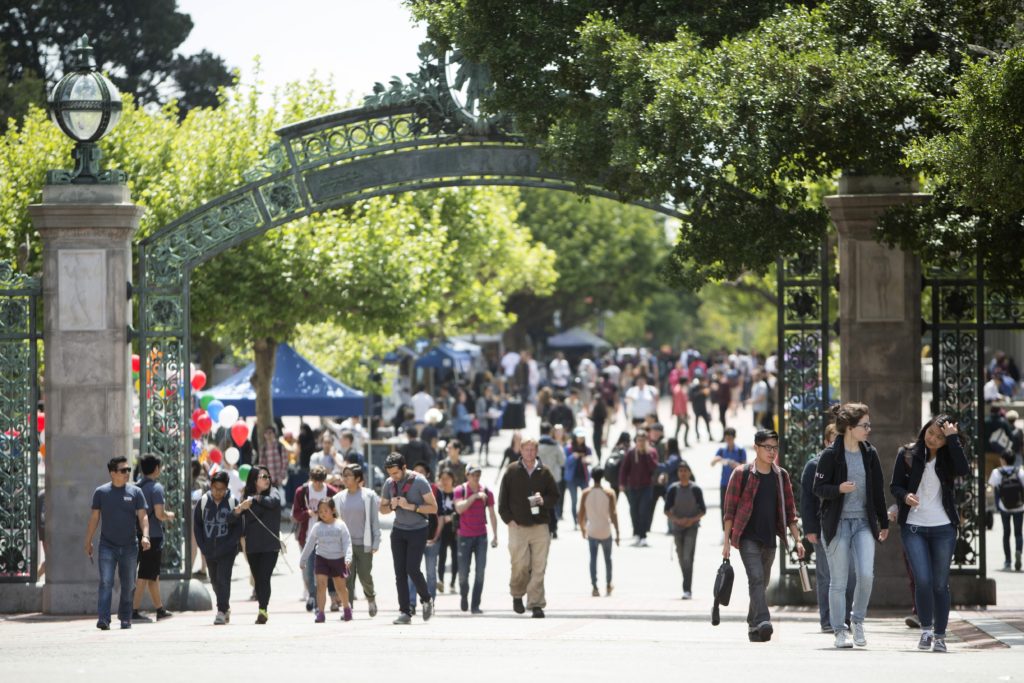Gov. Gavin Newsom expressed adamant opposition on Tuesday to any tuition increase at the ten-campus University of California, saying proposals to hike UC tuition over the next five years were unwarranted. Meanwhile, UC student leaders challenged the timing of a vote by UC regents on proposed tuition hikes originally scheduled for this week.
Facing those developments, the UC regents postponed voting on plans to raise undergraduate tuition in each of the next five years and instead will just discuss the matter on Wednesday. Any action on the tuition plans — which could have raised costs as much as $606 for new students in the fall and more in the four following years — may not occur until March or later.
Newsom’s press secretary Jesse Melgar, in an email to EdSource, explained the governor’s opposition to the UC proposals.
“Given the major increase for higher education funding provided in last year’s budget and the similar increase proposed by Governor Newsom for next year’s budget, he believes that the proposed tuition increase is unwarranted, bad for students and inconsistent with our college affordability goals,” Melgar wrote.
The governor, who serves on the regents board, recently proposed a state budget that would provide the UC system with a five percent, or $217.7 million, increase in state funding for next year boosting the total to about $4 billion.
Whether the governor’s opposition directly led to the vote delay could not be immediately confirmed. In some past years, UC leaders have raised the possibility of tuition hikes and later withdrew them after state funding was bolstered. The proposals under discussion would be the first UC tuition increase since 2017.
Varsha Sarveshwar, president of the UC Student Association, said she believed the vote was delayed after her organization protested that a vote this week would violate state law. She said the regents had notified the student association about proposed tuition increases for one year, but not for the five years the items turned out to include. That was a major change, she said. So the association told the regents that a vote this week would violate AB 970, the 2012 law that requires the student group be notified about any tuition plan 40 days before a vote on it.
The delay, she said, “is a small but meaningful victory for students.” Sarveshwar said her organization anticipates the tuition increase will return to the regents in March and May and that students will “continue advocating for flat tuition and for increased state investment.”
A statement from UC confirmed the postponement and attributed it to students’ protests over notification.
“We understand and take seriously the concerns by students who have requested more time to consider the proposed plans and welcome ongoing productive conversations with them. In the meantime, we look forward to a comprehensive discussion about tuition at tomorrow’s meeting, which will help inform a future vote by the board,” the statement said.
UC regents chairman John A. Pérez, in a statement from his office, said he determined UC’s noticing requirement would not have been met if a vote proceeded this week. So Pérez “concluded it would be inappropriate to take up the item without giving all stakeholders a chance to be heard with appropriate notice,” according to the statement.
One of the five-year plans under consideration would affect all UC undergraduates enrolled now and those starting in coming years by the same amounts. It is designed to begin with an across-the-board hike for the 2020-21 school year of $348 on top of the current $12,570 California undergraduates pay for mandatory tuition and university-wide fees. (Campus-based fees, housing, food and other expenses can bring the total expenses to $35,000 before any financial aid discounts.) Undergraduates from other states and nations would see tuition and university wide fees rise by 1,188 to $43,512 before housing and other costs.
What’s different from previous tuition hikes is that the proposal calls for extra increases each year through 2024 based on the California Consumer Price Index. The plan now projects those at about 3.3 percent in each subsequent year, with tuition and fees by 2024 likely totaling $14,670 for state residents and $49,452 for out-of-staters.
The other idea is more unusual. The so-called cohort plan calls for costs to remain stable for current students while each entering class would face higher costs and then be guaranteed no more increases for up to six years. Under that cohort plan, freshmen starting in fall 2020 would pay a $606, or 4.8 percent, increase. Then each entering class would face hikes likely to range from 3.3 percent to 4.8 percent based on a formula using inflation and other measures. The proposal projects that tuition and fees could reach $15,414 for state residents in the entering class of 2024 and $51,936 for non-residents.
UC officials stress that a third of all new tuition revenues is dedicated to financial aid for low- and middle-income students and that many students would not be affected by the tuition hikes. In fact, many students may actually see a $140 decrease in costs after UC aid and higher Cal Grants scholarships kick in, they said.
The rest of the new revenue would help hire additional faculty, allow enrollment to grow, cover rising costs of employee benefits and help support such programs as mental health counseling for students, among other things, the agenda item says.
To get more reports like this one, click here to sign up for EdSource’s no-cost daily email on latest developments in education.
